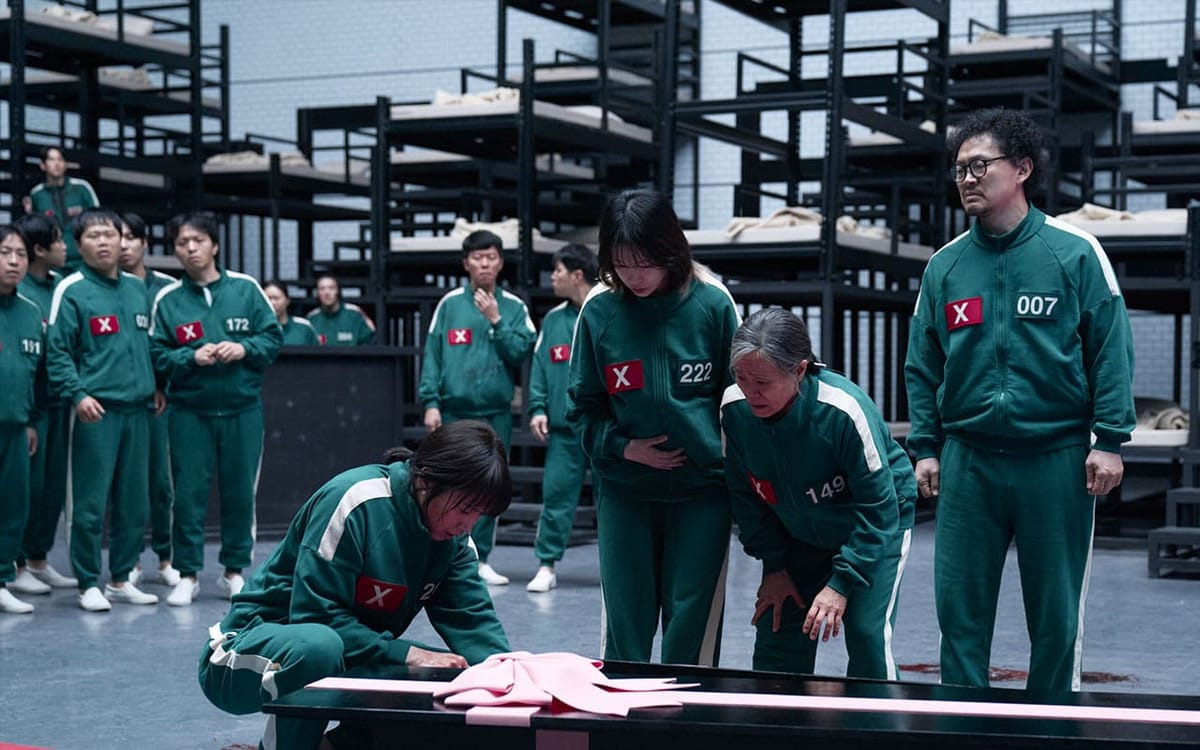🇬🇧🇪🇸Squid Game, Season 3: Game Over
"While not everyone’s ending feels completely satisfactory, as a whole the season did a good job of resolving their unique conflicts, basking in the ability to make us mourn for characters we’ve had not one, but two entire seasons to get attached to..."

Picking up right where we left off in the previous season, the third and final part of Hwang Dong-hyuk’s iconic show comes to a close, wrapping up all the plot points and character arcs in a black coffin with a pink bow.
Much like the first and second instalments, season 3 seems to struggle with its B-plot that takes place outside of the games, to the point that it is a common joke throughout the fandom to want to skip all the boat scenes because of how much more entertaining the games themselves are. Additionally, the finale leaves something to be desired in terms of its greater message – but then again, when a show has been dragged on for purely profit making reasons, one can only expect so much.
That said, the characters – specifically the players – continue to be explored with the nuance and tragic irony characteristic of Hwang’s writing, with heartbreaking and gutwrenching scenes that are sure to make me cry even upon rewatch. While not everyone’s ending feels completely satisfactory, as a whole the season did a good job of resolving their unique conflicts, basking in the ability to make us mourn for characters we’ve had not one, but two entire seasons to get attached to – a luxury the first part never had.
The third season of Squid Game is not perfect, and the viewer can’t help but feel unnerved by the dystopian reality of an anti-capitalist show becoming what it swore to critique. But if we have to deal with shows stretched out for the purpose of making money, we might as well make sure they are as good as this.

Spanish version
Retomando la acción en el punto exacto en el que había quedado en la temporada anterior, la tercera y última parte de la icónica serie de Hwang Dong-hyuk llega a su fin, cerrando todas las líneas argumentales y el desarrollo de los personajes con un ataúd negro con un lazo rosa.
Al igual que la primera y la segunda entrega, la tercera temporada parece resentirse en la trama secundaria que transcurre al margen de los juegos, hasta el punto de ser común entre los fans la broma de querer saltarse todas las escenas del barco, pues los propios juegos resultan mucho más entretenidos. Además, el final deja mucho que desear en cuanto a su mensaje central, pero claro, cuando una serie se alarga por motivos puramente económicos, tampoco cabe esperar demasiado.
Dicho esto, los personajes, y en concreto los jugadores, siguen explorándose con los matices y la ironía trágica característicos del buen hacer guionístico de Hwang en escenas desgarradoras que lo sé bien me harán llorar cuando las vuelva a ver otra vez. Aunque el final de ciertos individuos no es del todo satisfactorio, la temporada en general resolvió adecuadamente sus conflictos, regodeándose en la capacidad de hacer que nos lamentemos por las penas de personajes de los que nos hemos encariñado durante dos temporadas enteras, lujo que la primera parte no tuvo a su alcance.
La tercera temporada de El juego del calamar no es perfecta, y puede que el espectador se inquiete ante la realidad distópica de una serie anticapitalista que acaba siendo lo que juró criticar. Pero si nos vemos ante series que se extienden con el propósito de sacar dinero, más nos vale que sean tan buenas como esta.





